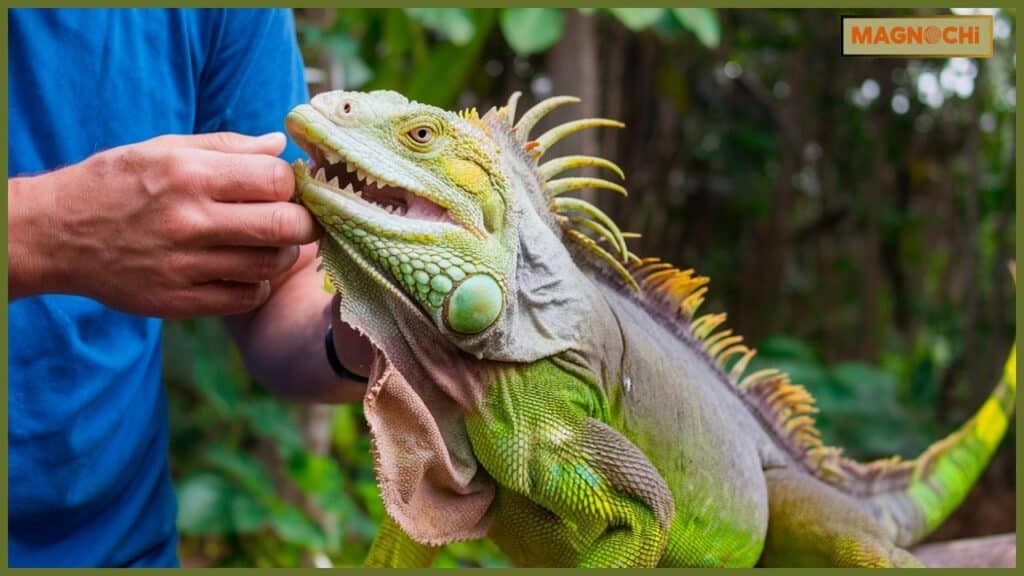Do Iguanas Attack Humans? Iguanas are some of the most fascinating reptiles in the world, but they are often misunderstood. Their unique features, calm demeanor, and herbivorous nature lead many to believe that they are harmless creatures, yet there are persistent myths about Iguanas attacking humans.
This article seeks to dissect those myths, offering an accurate look into the behavior of iguanas, the reality of their aggression, and what happens when these reptiles do, on rare occasions, lash out.
With proper knowledge and understanding, it’s possible to appreciate iguanas for the extraordinary creatures they are while ensuring that you stay safe and interact with them responsibly.
Here, we will explore the truth behind iguana attacks, the reasons behind their aggression, how to recognize early warning signs, and the best practices for safely handling and interacting with them.
What Are Iguanas? Understanding These Remarkable Reptiles
Iguanas belong to the Iguanidae family, a group that includes some of the largest and most captivating reptiles.
As cold-blooded creatures, iguanas rely on external sources of heat to regulate their body temperature, making them particularly well-suited for life in warm climates.
But despite their reptilian nature, iguanas are often calm and docile, and most of their aggression occurs only when they feel threatened.
Physical Features of Iguanas
Iguanas have several distinct features that set them apart from other reptiles. These include:
- Scaly Skin: Iguanas have tough, scaly skin, which helps protect them from predators.
- Sharp Claws and Long Tail: These are primarily for climbing and self-defense. Iguanas use their sharp claws for gripping tree branches and their long, muscular tails for balance and defense.
- Serrated Teeth: Iguanas are herbivores, and their serrated teeth are specially adapted for cutting through tough vegetation.
- Dewlap: A flap of skin located beneath the chin, which the iguana puffs out to appear larger during territorial disputes or mating season.
Behavior of Iguanas
Though iguanas may seem intimidating due to their size, their aggressive behavior is usually a defensive reaction to stress or perceived threats.
Iguanas are naturally peaceful creatures and prefer to flee rather than fight when faced with danger. Iguanas in the wild usually avoid confrontation by running up trees or hiding.
However, in situations where they cannot escape, they may display aggressive behaviors such as hissing, head bobbing, and tail whipping.
Iguanas and Aggression: When Do Iguanas Attack Humans?
Iguanas are not naturally inclined to attack humans. Most interactions with humans, whether in the wild or captivity, are peaceful.

However, there are times when iguanas may become aggressive, leading to bites, scratches, or tail whips. To understand why iguanas sometimes lash out, it’s essential to explore the factors that can provoke these reactions.
Are Iguanas Naturally Aggressive?
The short answer is: no. Iguanas are not inherently aggressive. However, like many animals, they will defend themselves when they feel threatened, cornered, or stressed.
In the wild, iguanas are primarily herbivores and spend most of their time feeding on leaves, fruits, and flowers. They are not predators and generally avoid confrontations with other animals.
However, there are certain situations in which an iguana’s behavior can turn defensive:
- Territorial Defense: Male iguanas are more territorial, especially during the mating season. They can become aggressive if they perceive a threat to their space or a challenge from another male.
- Handling Stress: Iguanas do not enjoy being handled roughly or suddenly. If they are mishandled or feel trapped, they may react with aggression.
- Fear and Anxiety: Like many animals, iguanas experience fear, which can trigger aggressive defensive mechanisms.
- Health Issues: An iguana in pain due to injury or illness may become aggressive as a response to feeling vulnerable.
Signs of Aggression in Iguanas
Iguanas, like many animals, give warning signals before escalating to an attack. These signals are vital in recognizing when an iguana feels threatened. Some common signs of aggressive behavior include:
- Head Bobbing: This is a common behavior, especially among males, to assert dominance or warn off a threat. If an iguana is head bobbing at you, it’s a sign that it perceives you as a threat.
- Hissing: A clear warning sign. When an iguana hisses, it’s telling you that it feels threatened, and it may bite or act defensively if you don’t back off.
- Puffing Up Dewlap: The dewlap, or flap of skin beneath the iguana’s chin, is puffed up during a territorial dispute or when the iguana is trying to appear larger and more intimidating.
- Tail Lashing: Iguanas use their muscular tails as a defensive tool. When threatened, they may lash their tail to protect themselves. A tail whip can cause bruises, cuts, or fractures, so it’s important to recognize this behavior before it escalates.
What Happens When an Iguana Attacks? The Mechanics of Injury
When an iguana attacks, the injuries it causes are often due to the use of teeth, claws, or the tail. Understanding the risks involved with iguana attacks can help you prepare for and avoid these incidents.

Iguana Bites
An iguana bite can cause serious injury, especially if the iguana feels cornered or threatened. Iguanas have sharp, serrated teeth designed for cutting plant material.
While their bite force is not as strong as that of a predator, it is still capable of causing deep cuts and intense pain.
- Do iguana bites hurt? Yes, iguana bites are painful. The teeth are sharp, and a bite can tear the skin. In addition, iguana mouths may contain bacteria like Salmonella, which can lead to infection if the wound is not properly cleaned.
- Can an iguana bite your finger off? While it’s unlikely that an iguana could sever a finger completely, a bite could cause significant damage, especially to the skin and underlying tissue. If the iguana is large, the bite may require medical treatment.
- How to treat an iguana bite? The first step is to clean the wound thoroughly with soap and water. Apply an antiseptic and seek medical attention if there is significant bleeding or signs of infection.
Tail Whips
An iguana’s tail is one of its most powerful defensive tools. Iguanas have strong, muscular tails capable of striking with considerable force.
A tail whip can cause bruises, lacerations, and even fractures in extreme cases. Iguanas are capable of whipping their tails quickly, so it’s essential to be cautious when approaching them.
Claw Scratches
Iguanas have sharp claws, which they use for climbing and gripping surfaces. While their claws are not used as offensive weapons, they can still cause scratches and minor injuries if the iguana feels threatened.
Iguanas Use Biting as a Defense Mechanism
Iguanas have sharp teeth, which they use to bite as a defense mechanism when threatened. Their bite can be powerful enough to cause deep cuts and bruising, especially if the iguana is startled or cornered. Although iguana bites are typically not life-threatening, they can still be painful.
Do Iguanas Bite Without Warning?
Iguanas generally don’t bite without warning. Instead, they give signals before becoming aggressive. Some common warning signs include:
- Hissing: When iguanas feel threatened, they often hiss as a warning to stay away.
- Head Bobbing: This behavior is typically a sign of dominance or territoriality.
- Dewlap Puffing: The dewlap, a flap of skin under the chin, may puff out as a sign of aggression.
If an iguana bites, it’s usually a reaction to feeling threatened or provoked. It’s rare for them to bite without some form of warning.
Are Iguanas Dangerous to Humans? Myths vs. Reality
There are various misconceptions about the danger of iguanas. While it is true that they have defensive behaviors that can cause injury, Iguanas are not inherently dangerous to humans.
Most of the time, iguanas will not attack unless provoked, and their primary response to a threat is to flee. However, they can inflict harm if cornered or mishandled, and it’s essential to treat them with respect and understanding.
Do Iguanas Carry Diseases?
One of the major concerns when it comes to iguana bites or handling is the potential for disease transmission. Like many reptiles, iguanas can carry Salmonella, a bacteria that can cause gastrointestinal illness in humans. Salmonella is commonly found in the feces of reptiles, including iguanas.
- Can iguanas transmit diseases? Yes, Salmonella is the most common disease associated with reptiles. Always wash your hands thoroughly after handling an iguana or cleaning its habitat, and take care when dealing with their waste to minimize the risk of infection.
How to Safely Handle and Interact with Iguanas
If you want to keep iguanas as pets or interact with them in the wild, it’s important to know how to handle them properly to avoid triggering aggression and injuries. Here are some tips to ensure safe interactions with iguanas:
1. Understanding Iguana Behavior
Before interacting with an iguana, it’s important to understand its body language and signs of aggression. Recognize the early warning signs like head bobbing, hissing, or dewlaps puffing, and back off if the iguana shows any of these signs. Iguanas do not like to feel trapped, so always give them the option to retreat.
2. Providing Proper Habitat
If you keep an iguana as a pet, make sure its environment meets its physical and dietary needs. A stressed iguana is more likely to become aggressive. Proper care, including a proper diet (fruits, vegetables, and leaves), temperature regulation (basking spots), and space to roam, will keep your iguana calm.
3. Handling Tips
- Approach Slowly: Iguanas are not accustomed to sudden movements, so approach them slowly to avoid startling them.
- Support the Body: Always support the iguana’s tail and body when picking it up. Avoid grabbing the tail, as this can cause injury and stress.
- Respect Their Space: If an iguana seems nervous or stressed, allow it to retreat to a place where it feels safe.
Final Verdict: Do Iguanas Attack Humans?
While it’s true that iguana attacks can happen, they are rare and usually occur only when the iguana feels threatened, cornered, or mishandled.
Understanding iguana behavior, recognizing warning signs, and practicing safe handling techniques will go a long way in ensuring that you can interact with iguanas without causing harm to yourself or the animal.
Iguanas are peaceful creatures by nature, and aggression is typically a defense mechanism rather than an instinctual desire to harm.
FAQs
Do Iguanas Ever Attack Humans?
Iguanas rarely attack humans. They usually do so only if they feel threatened, cornered, or mishandled. Most interactions with humans are peaceful, and attacks are uncommon. Recognizing stress signs can help avoid aggression.
Are iguanas dangerous to humans?
No, iguana attacks on humans are rare. They generally only bite or lash out when they feel threatened or cornered.
What should I do if an iguana bites me?
Clean the wound immediately, apply antiseptic, and seek medical attention if necessary, especially to check for signs of infection.
Can an Iguana Hurt Me?
Yes, iguanas can potentially hurt you if they feel threatened. They may bite, whip with their tails, or scratch. While rare, these actions can cause injuries. Handling them carefully and understanding their behavior can minimize risk.
Do iguanas carry diseases?
Yes, iguanas can carry Salmonella. Always wash your hands thoroughly after handling them.
Are Iguanas Aggressive to People?
Iguanas are generally not aggressive toward people. They may display aggression if they feel threatened or during mating season. With proper care and respect for their space, iguanas are calm and friendly. Avoid sudden movements to prevent stress.
Do Iguanas Understand Humans?
Iguanas don’t understand humans in the same way dogs or cats do. However, they can recognize their owners and associate them with food or safety. They also respond to sounds and familiar routines, making them aware of their environment.
Conclusion
Iguanas are fascinating reptiles that, under most circumstances, are not dangerous to humans. However, understanding their behavior, recognizing their stress triggers, and following safe handling techniques is crucial to avoiding potential injuries.
By respecting these animals and their space, you can safely interact with them and enjoy the unique opportunity to observe these reptiles in their natural or domestic environments.









